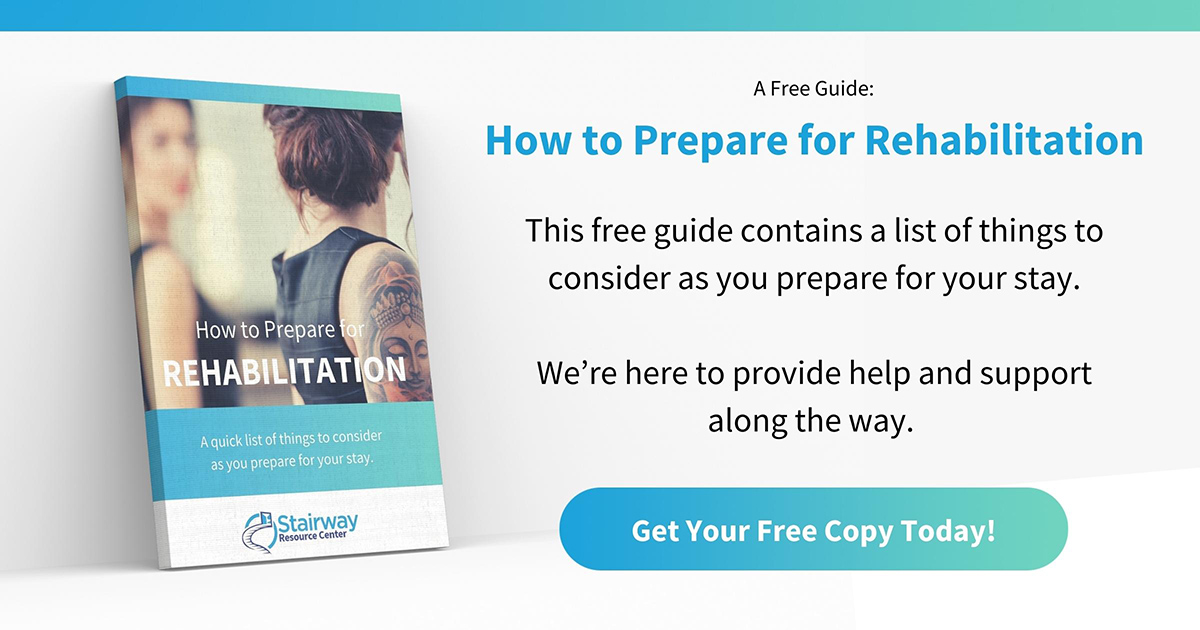If you are one struggling, you might reach a point in your journey where you choose to seek rehab for SUD (substance use disorder). This is a very personal decision that should not be taken lightly. Making a choice to seek help is one of the bravest things you can do, and it is critical to ensure you give yourself the best possible chance at finding lasting recovery.
If you’re ready to seek recovery, you know that there are many avenues available for treatment. As such, one of the most important things you can do is find a rehabilitation program that best suits your needs. Whether you determine residential or outpatient treatment fits you best, there are certain steps you can take to ensure that you and your loved ones are well prepared for treatment to begin.
Rehabilitation for Substance Use Disorder (SUD)
The term “rehabilitation” can be used to describe various recovery tools designed to treat many different illnesses and injuries. Regardless of what they’re designed to treat, a rehabilitation program typically involves developing practices and habits that ensure you can recover from the injury and continue to function well in your everyday life. So, while the definition of rehabilitation is intended to apply generally to any type of injury, illness, or disability, it is especially applicable to substance use disorder.
Substance use disorder, or SUD, is a recognized condition where the repeated use of substances like drugs or alcohol contributes significantly to illness and physical or mental impairments. The substance also creates problems with maintaining personal responsibilities. Individuals struggling with substance use disorder often seek a rehabilitation program to help them achieve recovery and maintain it long-term.
“Having program-specific resources, information, and support readily available as you prepare to enter a treatment program can make a world of difference.”
Types of Rehab for SUD
There are several types of rehabilitation specifically created to help individuals recover from substance use disorder. These are often individualized and curated to meet the specific needs of each person seeking treatment. Despite the personalization of these programs, many of them follow a similar format or structure. This structure is a way for those in the program to develop healthy and constructive habits that will help them maintain their sobriety once they have completed the program.
Furthermore, dual diagnosis programs treat a mental health disorder (PTSD, depression, etc.) along with a substance use disorder (use of alcohol and/or substances such as heroin, cocaine, etc.). Both are disorders that deserve isolated treatment. It’s why many addiction rehab programs offer dual diagnosis treatment.
Some of the most common types of rehabilitation programs are:
Long-Term Residential Treatment
These programs are structured in a way that the participants receive support and treatment all day, every day. Therapeutic communities are the most common form of long-term residential treatment, and they often require individuals to stay from six months to a full year. The presence of in-house medical and mental health personnel can provide the individual with around-the-clock medical care, prescription medications, and support services as they are needed.
Short-Term Residential Treatment
Similar to long-term residential treatment, these treatment programs offer support on a 24-hour basis and are often based within a hospital or medical facility. Many of the treatment methods and resources are similar to long-term treatment, but the stay is not as long. Most individuals involved in a short-term residential program will complete medically-assisted detox, then stay anywhere from three to six weeks. They are encouraged to get involved in an outpatient treatment program.
How to Prepare for Rehab for SUD

Making the decision to enter a rehabilitation program can be overwhelming. There are many factors that contribute to making the right decision for you, such as the severity of your SUD, the type of treatment that will be the best fit, and even the specific location you will seek treatment. Once that decision has been made, it’s time to begin preparing so you can truly get the most out of your chosen program.
We’ve rounded up several steps you can take to ensure that you and your loved ones are fully prepared for your stay.
Plan For the Time Commitment
Regardless of the type of treatment you choose, there is a significant time commitment involved—even if you don’t plan to travel for a 24/7 inpatient stay. Of course, if you are entering an outpatient treatment program, you’ll have a bit less to prepare regarding getting your personal affairs in order. The biggest step is often to ensure that your work and personal schedules are set up in a way that allows you to meet the time commitment for the duration of your program.
Any type of residential program will require a much more significant time commitment since you will be unable to work or be with your family for the duration of your stay. It is essential that you seek approval from your employer to take the necessary leave of absence so that you are able to return to work once your treatment has ended. You will also need to put plans in place so that any of your personal commitments are either paused or taken care of by someone else while you are in treatment.
Gather the Supplies You Need to Go to Rehab for SUD
When you are entering a rehabilitation program, it is important that you only bring approved essentials with you. Anything else may serve as a distraction and hinder your progress or even get you removed from the program. It is essential that you strictly adhere to the list of items that are permitted and avoid the prohibited items.
The program should provide you with a list of essentials and a list of prohibited items. The essential things you need may look different depending on your treatment program, but you should also bring any necessary clothing, toiletries, writing utensils, medications, and permitted entertainment like books and magazines. Prohibited items often include weapons, drugs, alcohol, pornography, and personal electronics that can connect to the internet. Ask ahead of time if the program allows you to bring tobacco and a personal cell phone.
It is also important to make sure you have any necessary documentation, such as insurance and identification, so that the process of entering rehab runs more smoothly.
Prepare Your Family

This may be one of the most difficult steps as you prepare for a stay in a rehab program. There are many facets to ensuring that your family is prepared for you to be away, from logistical needs to emotional prep.
Logistically, it is important to make sure that any of your responsibilities within your family are taken care of while you are away. This means that child care, pet sitting, and care for elderly or disabled family members must be given the necessary attention. Incidental responsibilities like bill paying, chores, and others will need your attention, as well.
Emotionally, it can be difficult to prepare for such an absence. Children may be too young to understand what is happening, and other family members may not be supportive. It is important that you maintain open and honest communication both before and after you begin treatment and present as much information as you can, depending on the person’s age and comfort level. After treatment begins, keep your family up to date on your progress as much as possible.
Anticipate Relationship Changes
One major step in recovering from substance use disorder is addressing any relationships in your life that will be detrimental to your recovery. You will need to prepare yourself for shifts in personal relationships as well as lost connections with places or events that once inspired substance use.
It is not uncommon for those struggling with SUD to surround themselves with others who are actively addicted and do not support their journey to recovery. As you prepare to enter any type of rehabilitation program, it is important that you are able to identify those people and end your connection with them. This is a very difficult decision to make but is necessary for successful recovery. The same is true for locations, activities, or events that you associate with your substance use. To recover fully and move forward, you must completely sever any connection you have with those places.
You must also prepare for your relationships with your loved ones to change. You may need to keep your distance from those who do not understand or support your decision to seek treatment. However, after recovery has begun, you will likely be able to begin repairing your relationships with your loved ones so you can pursue a healthy, happy future.
[colorsection bgcolor=”dkbluebg”]“To cope with these changes and make the transition into rehab easier, there are several things you can do before your program begins.”[/colorsection]
How to Transition to Rehab for SUD
Once you have made the necessary preparations leading up to your stay in a treatment program, you must then contend with the transition into treatment. This can be difficult mentally, physically, and emotionally because the program is designed to help you create an entirely new, healthy lifestyle.
As such, when you first enter a rehabilitation treatment program, it can be overwhelming. You are faced with a new schedule, an intensive treatment plan, unfamiliar surroundings, and possibly new medications. In addition, you’ll be asked on a consistent basis to face your substance use disorder head-on during both individual and group sessions.
To cope with these changes and make the transition into rehab easier, there are several things you can do before your program begins.
Prepare for Physical Changes
It is important to understand what your body may go through physically when you enter a treatment program. Depending on the types of substances you have been using, and how severe your substance use disorder is, you will likely face withdrawal symptoms. Common symptoms of withdrawal are nausea, an increased heart rate, sweating, hot or cold flashes, and more. These can be very difficult to cope with but typically pass within a few weeks. Fortunately, treatment programs are designed to help you overcome withdrawals and remain as comfortable as possible.
While withdrawal can be difficult, there are also positive physical changes your body will experience. Most rehabilitation programs focus on helping you create sober strategies and a healthier lifestyle, so there will be steps in place to help you do so. This may include a healthy diet and consistent sleep, regular opportunities for exercise, and meditation or mindfulness training, among other things. If you begin implementing these steps before you enter the program, even in small increments, it can make the transition much easier and ultimately improve your recovery journey.
Look For the Big Picture

When you are struggling with substance use disorder, it can be very easy to get caught up in the challenges and struggles of recovery. The transition period can be both painful and overwhelming, so you may find yourself focusing on the negatives rather than the progress you are making. Be intentional about establishing a positive mindset; focusing on the big picture can make a significant difference in your recovery journey.
Make the Commitment to Recovery
A key aspect of successful recovery from substance use disorder is your commitment to it. Your recovery journey will not be successful if you are not fully committed to seeing it through to the end. As you are preparing to enter any type of treatment program, it is important to focus on the reason you want to begin recovery, whether it is for your own health and wellness or as a way to rebuild and strengthen relationships with your loved ones. Keeping your end goal in mind throughout the transition into a rehab program will help keep you centered.
Be Prepared to “Fail” at First
Rehabilitation for addiction or substance use disorder is hard, to say the least, and it will remain hard through the beginning stages of recovery. Admitting that you have a problem and need help requires vulnerability, while detoxing from harmful substances in your body takes time and is painful. Being open with strangers about these struggles and challenges may feel foreign initially. All of those feelings are valid and are a part of the recovery process.
As you prepare to transition into your rehab program, keep in mind that you may not get everything right at first. You may find yourself unwilling to share openly during counseling or group therapy sessions or maintaining a healthy diet and consistent sleep schedule may prove difficult while you are dealing with your detox and withdrawal. However, it is important to keep in mind that none of these things means that your recovery will fail. If you are aware of and prepared for these challenges before your program begins, they will be much easier to face when they come.
Download the Rehabilitation Guide
Committing to a rehabilitation or treatment program is a major decision, as well as an important step in your recovery process. The transition into any treatment program will come with its own unique challenges as you adjust to and develop a new, healthier way of life. Having program-specific resources, information, and support readily available as you prepare to enter your program can make a world of difference.
A free digital guide will help you prepare for rehabilitation. This guide outlines six things you can do as you prepare for your rehab and treatment program. From practical tips about time off and how to pack to ways to prepare yourself mentally, it’s a quick, easily-digestible look at how you can prepare for addiction recovery.
Sources
- https://web.archive.org/web/20160212182504/http://www.dol.gov/whd/fmla/
- https://web.archive.org/web/20160219223853/http://psychcentral.com/blog/archives/2014/09/27/30-journaling-prompts-for-self-reflection-and-self-discovery/
- https://nida.nih.gov/publications/principles-drug-addiction-treatment-research-based-guide-third-edition/drug-addiction-treatment-in-united-states/types-treatment-programs
- https://www.samhsa.gov/find-help/disorders#


